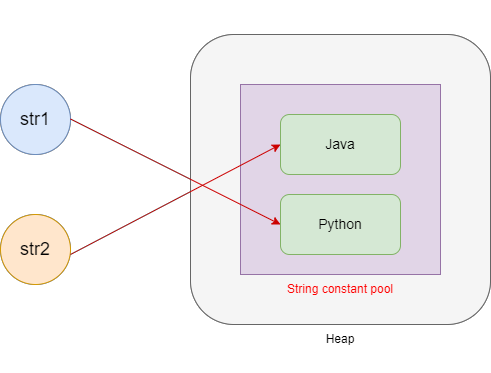Why Are Strings Immutable in Java? Insights right into Memory Performance
Wiki Article
What Is Unalterable Strings and Exactly How It Functions
In the world of programs, recognizing the principle of immutable strings is vital for developing robust and secure applications. Immutable strings refer to strings that can not be changed after they are produced, guaranteeing data honesty and predictability within the code. This essential concept plays an essential role in various programs languages and uses an unique technique to dealing with information. By discovering the ins and outs of how unalterable strings work, one can reveal a globe of benefits and possibilities that can elevate the quality and performance of software application development.The Fundamentals of Immutable Strings
Unalterable strings, as an essential concept in shows, are personality series that can not be transformed once they are created. This suggests that as soon as a string is designated a value, that worth can not be changed. In languages like Python and Java, strings are unalterable items, bring about numerous implications in terms of memory monitoring and information honesty.One of the essential benefits of immutable strings is that they offer a complacency in information adjustment. Given that the material of an immutable string can not be customized, it guarantees that the initial information remains intact, lowering the threat of unintentional modifications throughout program execution (Why are strings immutable in Java?). This home additionally streamlines debugging processes, as programmers can rely on that once a string is defined, its worth will certainly not be unintentionally modified
When a new string is produced based on an existing one, instead than customizing the original string, the brand-new value is kept independently. In general, recognizing the fundamentals of unalterable strings is essential for mastering programs ideas and optimizing code effectiveness.
Advantages of Unalterable Strings
Building upon the safety and security and effectiveness benefits of immutable strings, their benefits reach boosting code reliability and simplifying simultaneous shows tasks. By being immutable, strings can not be changed after creation, which gets rid of the threat of unintentional adjustments in the information they keep. This integral immutability makes sure that when a string is developed, its value remains continuous throughout the program's execution, decreasing the possibilities of insects brought on by unforeseen changes.Additionally, unalterable strings contribute to code reliability by making it much easier to reason concerning the state of a program. Considering that strings can not be changed, programmers can rely on that a string will constantly hold the exact same value, simplifying debugging and maintenance initiatives. This predictability leads to extra secure and dependable codebases.

Execution in Programs Languages
Within different shows languages, the incorporation of immutable strings is a basic aspect that impacts how data is dealt with and manipulated within code structures. The execution of immutable strings varies throughout various programs languages, with each language using its very own systems to support this concept.

On the other hand, languages like C and C++ do not have integrated support for immutable strings. Developers in these languages have to manually execute immutability by implementing rules within their code to stop straight modifications to string objects.
Best Practices for Functioning With Unalterable Strings
When handling unalterable strings in programming languages like Java and Python, adhering to ideal methods makes certain efficient and protected data manipulation. Among the key ideal practices is to utilize StringBuilder or StringBuffer rather of directly adjusting my explanation strings, specifically when taking care of comprehensive concatenation operations. These courses offer mutable alternatives for string adjustment, helping to stay clear of unnecessary memory allowances and boosting efficiency.Furthermore, when functioning with delicate data such as passwords or API keys, it is vital to stay clear of saving them as plain message in immutable strings. Making use of secure storage space devices like char varieties or specialized collections for dealing with sensitive info helps alleviate safety threats associated with immutable strings.
Real-world Applications and Instances
Exploring useful applications of unalterable strings in different industries exposes their significant influence on data stability and system integrity. In the medical care sector, immutable strings play a crucial function in making sure the see here now safety and discretion of patient data. By avoiding unapproved alterations to delicate information such as medical documents and prescriptions, unalterable strings help maintain conformity with strict personal privacy regulations like HIPAA.Financial establishments additionally benefit from the unalterable nature of strings to enhance the safety of consumer data and transaction documents. Unalterable strings help protect against scams and unapproved modifications to financial details, giving a durable defense versus cyber threats and ensuring the count on and self-confidence of clients.

Final Thought
Best practices for working with immutable strings include avoiding straight modifications and making use of methods that return new string things. Real-world applications of immutable strings include data file encryption, caching, and string manipulation jobs.Unalterable strings refer to strings that can not be altered after they are developed, ensuring information integrity and predictability within the code. When a new string is created based click for more info on an existing one, instead than changing the initial string, the new value is kept separately.In languages like Java and Python, strings are unalterable by default, meaning that as soon as a string object is created, its value can not be transformed - Why are strings immutable in Java?. Ideal practices for working with unalterable strings consist of staying clear of straight modifications and utilizing techniques that return brand-new string things. Real-world applications of unalterable strings consist of information encryption, caching, and string manipulation tasks
Report this wiki page